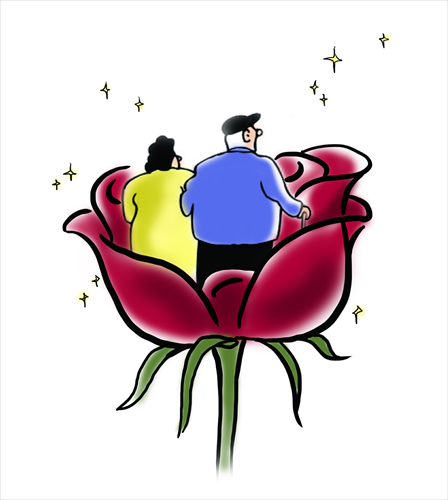Is ‘I love you’ harder to say in Chinese?

Illustration: Shen Lan/GT
Residents of Hangzhou, the capital of East China's Zhejiang Province, got a Valentine's Day surprise this week when a local hotel lit up showing "I [heart symbol] U." The romantic gesture had been arranged by Qiao Dewei, 84, for his wife Liu Shixiu, 83. With Liu now wheelchair-bound, Qiao said he wanted to give her the romance they'd never been able to have when young, planting a kiss on her cheek as she sat in a fancy white wedding dress.
But the hidden meat of the story wasn't the scale of the romantic gesture, however touching it was. It was that, according to the couple, this was the first time in their 67 years of marriage they'd ever expressed their feelings for each other. They'd never said or done anything romantic, not even the simple words "I love you."
That's not unusual for their generation. Peng Kaiping, a professor emeritus of psychology at Berkeley, told ChinaFile magazine that in his student days, "We said, 'wo xihuan ni,' ('I like you'), to express our deepest romantic feelings. Only in the more educated classes, where partners spoke English, were 'I love you's,' ever exchanged - and never in Chinese." But it's a habit that goes back some time. Qing writer Shen Fu's memoir Six Records of a Floating Life, composed around 1800, mentions "The strangest thing to me was that old couples seemed to treat each other like enemies. I did not understand why. Yet people said, 'Otherwise, how could they grow old together?' Could this be true, I wondered."
Of course, there were plenty of exceptions. Chinese poetry is full of romantic sentiments between husbands and wives, especially when parted by war or misfortune. Chinese drama is crammed with romantic love, married and otherwise - and with plenty of gender variations to boot. Indeed, the idea of romantic love, according to anthropologists Ted Fischer and William Jankowiak in a 1992 paper, exists across almost all cultures.
But the specific emphasis on love within marriage may be more a Western idea than a Chinese one. Confucian philosophy talks about relationships between husband and wife, but only as one of five important bonds, and ranks it lower than the ever-emphasized filial piety. The great ceremonial obsession was with parental funerals, not weddings. Women often seem barely to exist in ancient Chinese philosophy, moral and political, however much of a role they played in everyday life and court politics in reality.
Like the students who used English for their deepest feelings, Qiao and Liu - aided by their grandson, who bought up the hotel rooms that night to create the pattern of lights - turned to Western culture to express romance, writing in English, using a heart symbol established in the West, and wearing Western-style wedding clothes.
It's true that marriage can seem equally absent from much of Greek philosophy, although ideas of love, in various forms, aren't. But it's vital to Jewish thought, and later to Christianity, because both conceive of numerous metaphysical relationships - between God and Israel, between God and humanity, or between Christ and the Church - through the language of marriage. The Bible is suffused with references to weddings and to love, metaphysical and practical; the stories in Genesis turn around a succession of couples, while Jesus is repeatedly referred to as a bridegroom.
For Christian theologians, therefore, married love was a vital part of human life, even if the reality of marriage was often grimly practical. And later streams of philosophy, which both drew upon (sometimes unconsciously) Christian thought and criticized it, furthered these traditions. The emphasis on individual will and choice in the Enlightenment created the modern ideal of the wedding, while an increasing consumer society produced the accoutrements of the modern ceremony, from the diamonds pushed by 19th century manufacturers as essential to romance to the white flowing gown.
Using the West's language doesn't seem a bad thing to me. Borrowing is how cultures are made, and the feelings behind it are arguably the same even if the words are foreign. Young people today seem to have no problem saying "Wo ai ni" in their own language. Perhaps, just as the seventh day of the seventh month of the lunar cycle has become a "Chinese Valentine's Day," that borrowing allows feelings that were always there to be expressed more freely.
The author is an editor of the Global Times. jamespalmer@globaltimes.com.cn